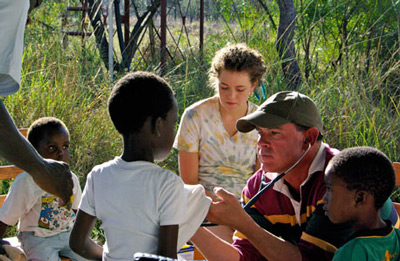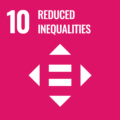Access to research helps health professionals treat patients in low-income countries

Dr. Tim Meade treats Zambian children at a Tiny Tim & Friends clinic in Lechwe Village, about two hours outside the Zambian capital of Lusaka.
Research4Life’s HINARI program awarded Medical Library Association medal
It’s 2003, and a 7-month pregnant woman is living in the bus terminal in Lusaka, Zambia. She cannot afford medical care, but she needs it: she’s HIV positive. When the Sisters of a local orphanage find her, they take her to Dr. Tim Meade, a doctor specializing in HIV care in pregnant women and children. Dr. Meade delivered the baby successfully, and to thank him, the mother called the boy Tim.
About 1 in 5 people are living with HIV in Lusaka, and after treating the pregnant woman and baby Tim, Dr. Meade was inspired to set up the nonprofit organization Tiny Tim & Friends to support thousands of other patients.
Having access to the latest research on HIV is vital, and for a nonprofit organization in a developing country, cost is a key concern.
Last month, the program that provides this much-needed access was awarded with the Medical Library Association Louise Darling Medal, honoring the program for its medical research collection.
Free and low-cost literature for low-income countries
In 2002, the World Health Organization teamed up with 6 publishing partners, including Elsevier, to establish Research4Life’s HINARI Access to Research in Health program, which enables people in low- and middle-income countries to access one of the world’s largest collections of biomedical and health literature. Today, some 500 publishing partners make their content available through HINARI. Research institutes, doctors and organizations like Tiny Tim & Friends use this content to improve people’s lives through healthcare improvements and policy changes. (…)
Read the full article and get more information about HINARI and the impact of the 2015 Louise Darling Medal on Elsevier Connect:
- Elisa Nelissen, “Access to research helps health professionals treat patients in low-income countries“, 30 June 2015


















